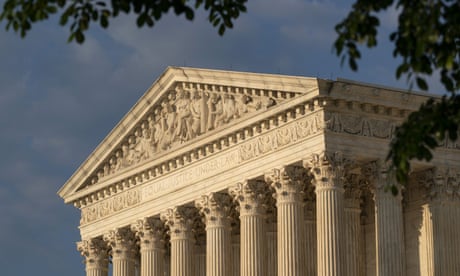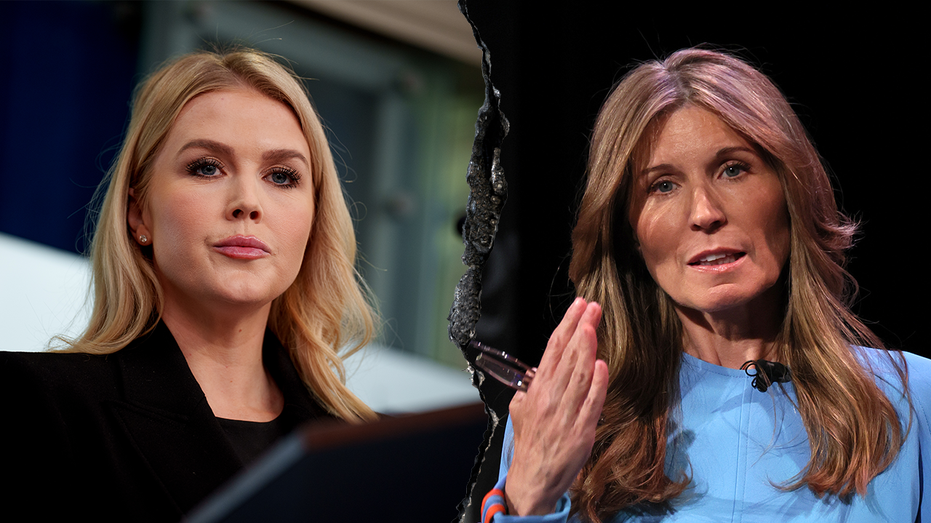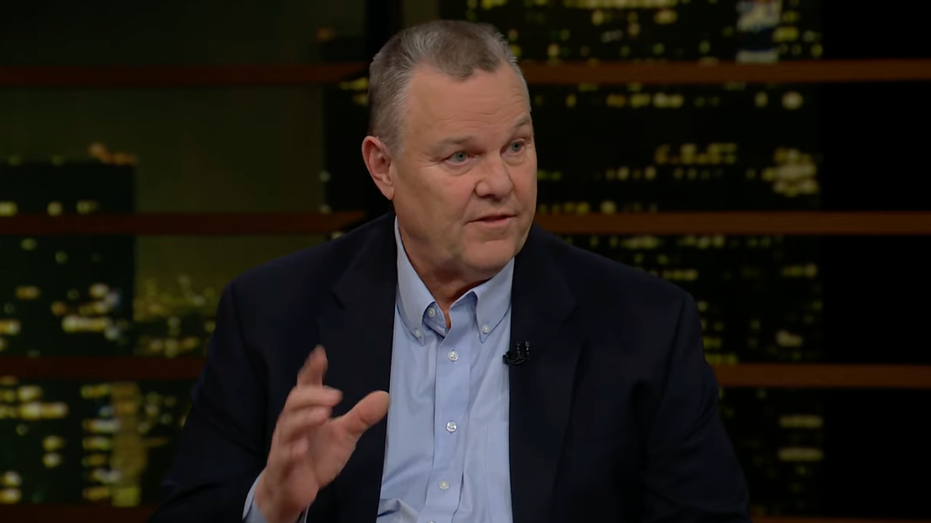- by foxnews
- 09 Mar 2025
US supreme court to decide cases with ‘monumental’ impact on democracy
US supreme court to decide cases with ‘monumental’ impact on democracy
- by theguardian
- 03 Oct 2022
- in news

On Monday, the nine justices of the US supreme court will take their seats at the start of a new judicial year, even as the shock waves of the panel's previous seismic term continue to reverberate across America.
In their first full term that ended in June, the court's new six-to-three hard-right supermajority astounded the nation by tearing up decades of settled law. They eviscerated the right to an abortion, loosened America's already lax gun laws, erected roadblocks to combating the climate crisis, and awarded religious groups greater say in public life.
The fallout of the spate of extreme rightwing rulings has shaken public confidence in the political neutrality of the court. A Gallup poll this week found that fewer than half of US adults trust it - a drop of 20 points in just two years and the lowest rating since Gallup began recording the trend in 1972.
Justices have begun to respond to the pressure by sparring openly in public. The Wall Street Journal reported that in recent speeches the liberal justice Elena Kagan has accused her conservative peers of damaging the credibility of the court by embracing Republican causes.
Samuel Alito, who wrote the decision overturning the right to an abortion in Roe v Wade, counter-accused Kagan (whom he did not name) of crossing "an important line" by implying the court was becoming illegitimate.
To add insult to injury, Ginni Thomas, the extreme conservative activist married to Justice Clarence Thomas, was questioned on Thursday by the House committee investigating Donald Trump's attempt to subvert the 2020 presidential election result, which she avidly encouraged.
With so much discord in plain sight, you might have expected the new supermajority created under Trump to opt for a calmer year ahead. No chance.
The choice of cases to be decided in the new term spells full steam ahead. "I see no signs of them slowing down," said Tara Groves, a law professor at the University of Texas at Austin.
"The supreme court has chosen to take on cases this term that raise a lot of hot-button issues - just after they decided a bunch of cases that raised a lot of hot-button issues."
From fundamental aspects of American democracy to LGBTQ+ equality, and the electoral power of racial minorities to protecting the environment, the conservative justices have selected a whole new slew of targets that fall squarely within Republican priorities. The schedule for the first two days of oral arguments this week tells the story.
On Monday morning, the court will fling itself into the thick of environmental controversy in the latest case threatening the ability of the federal government to counter pollution. Having curtailed in June the ability of the Environmental Protection Agency (EPA) to curb emissions causing planet heating, the court will now hear arguments in Sackett v EPA, which has the potential to whittle down the agency's powers to uphold clean water standards.
Then on Tuesday, the court enters blockbuster territory with Merrill v Milligan. That case could topple the last remaining pillar of the Voting Rights Act, which has safeguarded the democratic rights of African American and other minority citizens for the past 57 years.
As Michael Waldman, president of the Brennan Center for Justice, put it in a briefing this week, the case adds to the court's upcoming docket "the raw issue of race in America".
Merrill v Milligan concerns Alabama, where Republican lawmakers want to draw up congressional district maps that would give Black voters the power to send just one African American member to Congress out of a total of seven representatives, even though Black Alabamans make up a quarter of the state's population. The map was blocked by three federal judges who ruled that it was racially discriminatory and that the state had engaged in racial gerrymandering.
In its brief to the supreme court, Alabama effectively invites the conservative justices to make it virtually impossible to challenge racial gerrymandering. Should the state's view prevail, challengers would have to show that racial discrimination was the primary intent behind how district lines were drawn.
"That's a very hard standard to prove," said Paul Smith, senior vice-president of the Campaign Legal Center. Should the supreme court side with Alabama, Smith added, "it would allow legislatures to undo Black and Latino-majority districts and do away with the opportunity of people to elect their own representatives".
The Alabama dispute epitomizes two visceral themes that run through several of the blockbuster cases this term: race and democracy. The race theme is central to one of the hottest-button cases of all - the challenge to affirmative action in universities.
On 31 October, the court will hear oral arguments in two parallel cases, both brought by Students for Fair Admissions, which describes its mission as "restoring color-blind principles" to colleges and universities. The first case confronts Harvard's race-conscious admissions policy, claiming it discriminates against Asian Americans; the second focuses on the University of North Carolina, which is accused of preferring Black, Hispanic and Native American applicants at the expense of white and Asian students.
There is a chilling echo in the concerted attack on affirmative action that is about to play out with what happened to Roe and Casey, the landmark abortion rulings which the supreme court overturned in June. In both arenas - abortion and affirmative action - legal precedent stood firm for half a century.
"It's been the law of the land now for 50 years that universities can take into account all aspects of a person's background, including their race," Smith said. "Schools have set up their entire systems based on reliance on that being the law, as reaffirmed multiple times by the supreme court, though it sure seems likely they will change course this time."
Such a racially charged term will collide with another seminal moment for the highest court - the arrival on the bench of the first Black woman in the court's 233-year history. When Ketanji Brown Jackson takes her place among the nine justices on Monday she will be powerless to touch the conservatives' unassailable dominance.
But like any new justice, she will be able to put her stamp on the court during a tenure which, at 52, could last for decades. It is perhaps unlikely that Jackson will pen excoriating dissenting opinions in her first term on par with those written last term by fellow liberal justice Sonia Sotomayor, who joined the court in 2009.
But it is equally implausible that Jackson, whose parents fled the south to escape Jim Crow segregation, will stand aside over issues as elemental as affirmative action and racial gerrymandering. How she handles such intense controversies as a rookie justice could reveal much about her future presence on the bench.
The second major theme of the coming term is democracy. In addition to the Alabama racial gerrymandering case, the court has agreed to take on the highly polarized subject of the role of state legislatures in federal elections.
Moore v Harper could have "monumental implications for American democracy", Groves believes. At the heart of the case is the debunked "independent state legislature theory", which has been embraced in recent years by radical Republicans who argue that the constitution gives state legislatures the overriding power to regulate federal elections.
Though legal scholars have largely rejected the doctrine, four of the nine justices - Alito, Neil Gorsuch, Brett Kavanaugh and Thomas - have paid lip-service to some aspect of it. Should they command the majority, they could give Republican-controlled state legislatures even more firepower to grab what is in effect minority rule through extreme partisan gerrymandering, with very little possible oversight from state courts.
At its most dystopian, an extreme ruling in Moore v Harper could wreak havoc in presidential elections in 2024 and beyond. John Eastman, the conservative law professor mired in legal peril over the central role he played in trying to overturn Joe Biden's victory on January 6, put the independent state legislature theory at the heart of his notorious memo laying out the roadmap for an electoral coup.
Smith explained that the supreme court could embolden state legislatures to dictate who wins presidential elections in their state according to political whim. "That might be unconstitutional under state law, but under this doctrine state courts would be powerless to prevent them."
As if race and the future of American democracy were not enough, the conservative justices are also bearing down once again on the right to equal treatment for same-sex couples. They have taken on a case asking whether a graphic design firm, 303 Creative LLC, should be able to turn away gay couples requesting help creating wedding websites on religious grounds.
The supermajority also wants to revisit the Indian Child Welfare Act, which for the past 44 years has been protecting Native American children from being forcibly separated from their families and tribes and placed in non-Native homes. The ACLU has warned that if the court overturns the act it could put "the very existence of tribes in jeopardy".
- by foxnews
- descember 09, 2016
'Speaker scum' on flights sparks debate among travelers: 'This is getting out of hand'
A traveler asked social media users to weigh in on flyers who play audio aloud on their devices and don't use headphones.
read more


